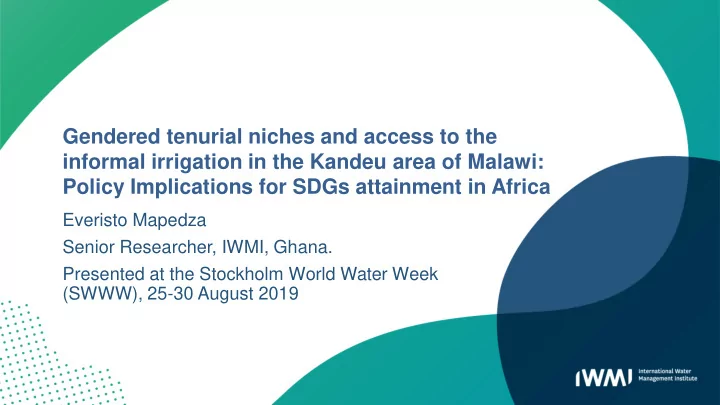

Gendered tenurial niches and access to the informal irrigation in the Kandeu area of Malawi: Policy Implications for SDGs attainment in Africa Everisto Mapedza Senior Researcher, IWMI, Ghana. Presented at the Stockholm World Water Week (SWWW), 25-30 August 2019
Organization • Introduction • Gender – an overview • Gender and Agriculture • Study Area • Methods • Findings • Implications • Conclusion
Introduction • “Tenure is not about land, it is about people ( men, women and youths). It is about land only as far as land can serve the needs of people (men, women and youths )” (à la Westoby 1967)
Gender Overview • Gender roles are the "social definition" of women and men - different societies and cultures, classes and ages, and during different periods in history • Gender - often governs the processes of production and reproduction, consumption and distribution • Gender differences - roles, power, resources for males and females, access to services, opportunities, information • Gender is often conveniently misconstrued as sex – biological differences – or women • It is about power relationships and power dynamics
Gender and Agriculture • Feminization of agriculture – blind spots • 50-60% of sub-Saharan labour force are women (FAO 2011, 2010; COMESA) • Women have lesser access to inputs than men (FAO 2011) • Female farmers produce less than male farmers due to unfavorable context (IFPRI 2010) • Demystify gender – more informed team – ‘they don’t get it’ – how do we engage? • Partners/Implementers are gender sensitive “Gender (charity) begins at home • SDGs - ‘Business as unusual mode’ • Nothing about women/youths without women/youths
Study Area • Kaziputa Irrigation Scheme (Kandeu EPA) • 75 irrigators (22 men and 53 women) • Clubs: Gobeke, Chikamba, Chimwalira, Namichimba and Lithethe • Ntcheu District in Malawi • Central Region • 155-184 people/km² • 70-90% poverty levels – 52% at national level
Methods
Methods (cont’d)
Research Findings • Matrilineal and matri-local society (75-80%) – Ngoni (70%)! • Land inherited through women • Tenure – tenurial niches (Fortmann 1992; 1996 – going beyond De Soto security of tenure through titling • Avoid binary of male and female ownership – gradient from female to male – multiple stories “ I was given a piece of land by my grandparents from my father’s side since I had come to stay with my father after I separated with my wife long ago ”
Research Findings (cont’d) • Access – distributional equity, who gets what – going beyond neat bureaucracy to look at the social, economic and political dimensions of land tenure • There is need to monitor the dynamics, processes and sub-processes of the tenurial niches within the Kandeu area • Paradox of land ownership - not translating into control of benefits
Research Findings (cont’d) • Niches - men are re-negotiating their access to land through land rental arrangements • Markets – gender roles – ‘its not safe for women to travel overnight across the mountain range to the market’ – land tenure within the broader cultural spectrum • Men are involved in marketing – some say prices were ‘not good’ most of the time
Research Findings (cont’d) • Divorce your husband – torch (gendered access and control over land) • Role of uncles in decision making – men in key decision making
Whose Labour?
Access to Agricultural Extension
Social Capital
Implications • Land Tenure – key challenge for gender • Patriarchy and Matriarchy – agricultural productivity • Structure and agency • Focusing on structure tends to downplay individual agency in Africa • Norms yes – but how do people negotiate household norms of a ‘good wife’ ‘good husband’ ‘good migrant wife/husband’ (land access and control) • More informed Intra-Household analysis
Conclusion • Tenure is not absolute – it is fluid, created, challenged, modified, negotiated and re-configured - importance of tenurial niches • Move away from the binary - gradient • ‘I own. You own. He owns. She owns. We own. They control’ • Gender central – meeting SDGs in Africa
Thank You, Merci, Tatenda, Medase Acknowledging the support of the study partner communities in Malawi
Recommend
More recommend